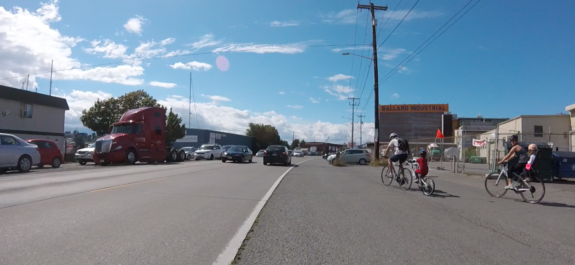Judge decides Missing Link megastudy did not adequately address economic concerns
 In yet another partial court defeat, the Ballard Missing Link of the Burke-Gilman Trail has once again been thrown into question this week after King County Superior Court Judge Samuel Chung sided with the city on two out of three of the major challenges to its environmental megastudy of the trail route. But that isn't enough.
In yet another partial court defeat, the Ballard Missing Link of the Burke-Gilman Trail has once again been thrown into question this week after King County Superior Court Judge Samuel Chung sided with the city on two out of three of the major challenges to its environmental megastudy of the trail route. But that isn't enough.
We are still trying to learn what exactly this means for the project, which is currently scheduled to begin construction early next year. So stay tuned. UPDATE: The City Attorney's Office told the Seattle Times they disagree with the decision and plan to appeal it.
Previous court decisions required the city to conduct a massive environmental impact statement ("EIS"), the kind of study typically required of megaprojects on a much larger scale than a short stretch of biking and walking trail. The 829-page study took years to complete at significant cost. It's safe to say that this is the most-studied section of trail in state history. Maybe in the nation?
Because the city conducted the EIS, trail opponents' only legal path was to argue that the city's study, which the Seattle Hearing Examiner approved, was legally inadequate. This should have been a pretty tough bar to clear, but they did it. Appellant attorney Josh Brower continues to surprise with his ability to win just enough to block or delay this project. This is the second time he has won small pieces of his cases against the trail in King County Superior Court.
On questions of safety and parking, the judge found the study adequate. So that's the good news. But on the question of economic impact, the judge found the study inadequate. Specifically, the judge "identified the potential for increased costs of insurance" as the basis for the ruling, according to a Cascade Bicycle Club statement. Cascade has been involved in the legal fight for many years, intervening on the city's behalf.
"We believe this can be resolved and that the City can move forward with getting construction back on track," the statement says.
The question of increased insurance costs has been floated for many years as a reason to block the trail. It's always been a somewhat baffling argument because the trail is safety project designed to provide folks biking and walking with a separated and protected space to do so. It also feels strange that the whims of a private insurance company could decide whether the city can build a trail on public right of way. But here we are. It has been an argument against the trail for so long that it is discouraging that the city did not address it well enough in its massive study to satisfy the court.
The case is moving to King County Superior Court Judge Roger Rogoff starting in January.
I have a question into the city about what it would take to satisfy the judge's concern and what the timeline for that could be. I will update when I hear back.
In the meantime, here's the full statement from Cascade:
While the members, leadership and staff of Cascade Bicycle Club are disappointed in the overall outcome of the ruling today in King County Superior Court, it is clear that Judge Samuel Chung agreed that the bulk of the Missing Link Environmental Impact Statement (EIS) was sufficient. Specifically, he ruled that the EIS was sufficient in the areas of traffic analysis and safety as well as the review of any loss of parking. Conversely, Judge Chung identified the analysis of economic impacts-specifically the potential for increased costs of insurance-as the single basis for ruling the EIS deficient. We believe this can be resolved and that the City can move forward with getting construction back on track.
"Unfortunately the real cost of this obstruction campaign is borne by the over 300 people a year who suffer injuries on the Missing Link," says Richard Smith, Executive Director of Cascade Bicycle Club. "For over 20 years, a few deep-pocketed individuals have delayed while the community of Ballard has waited for their preferred route."
Since the Environmental Impact Statement was completed in 2013, thousands of residents and businesses have weighed in on the EIS and subsequent design process saying they want to 'Complete the Missing Link!' During the EIS comment process alone, 77 percent of the 4,500 respondents indicated a preference to locate along the preferred alternative, which runs along NW 45th St., Shilshole Ave. NW and NW Market St.